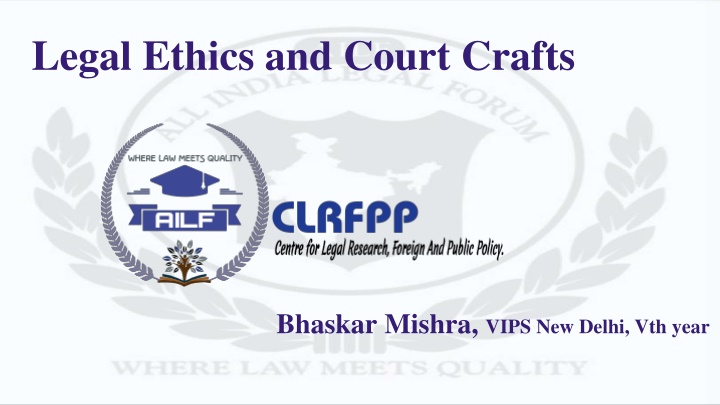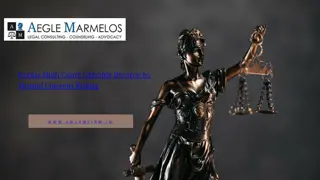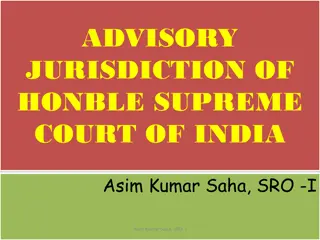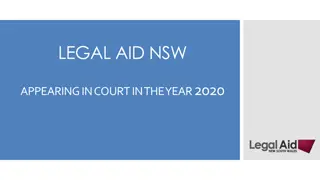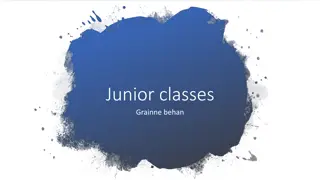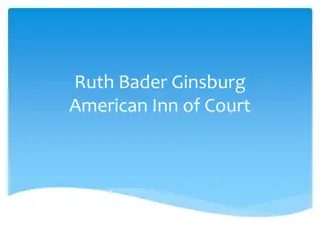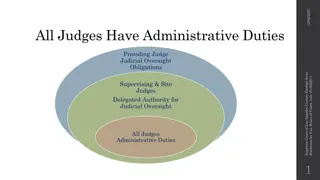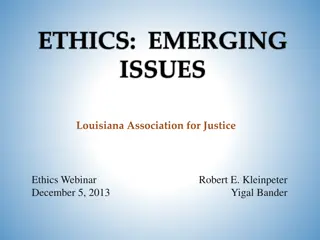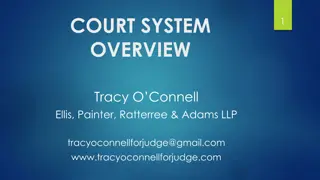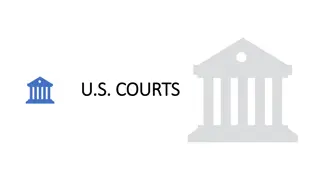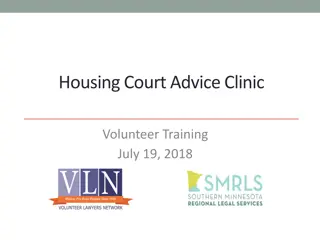Legal Ethics and Court Crafts
Dive into the world of legal ethics and court crafts with Bhaskar Mishra in this insightful book from his fifth year at VIPS, New Delhi. Gain a profound understanding of the intricate workings of the legal system and court practices that shape the field of law. Explore ethical dilemmas faced by legal professionals and master the art of courtroom strategies. A must-read for law enthusiasts and aspiring lawyers alike.
Download Presentation

Please find below an Image/Link to download the presentation.
The content on the website is provided AS IS for your information and personal use only. It may not be sold, licensed, or shared on other websites without obtaining consent from the author.If you encounter any issues during the download, it is possible that the publisher has removed the file from their server.
You are allowed to download the files provided on this website for personal or commercial use, subject to the condition that they are used lawfully. All files are the property of their respective owners.
The content on the website is provided AS IS for your information and personal use only. It may not be sold, licensed, or shared on other websites without obtaining consent from the author.
E N D
Presentation Transcript
Legal Ethics and Court Crafts Bhaskar Mishra, VIPS New Delhi, Vth year
MEANING OF ETHICS Derived from Greek word ethos meaning character. Object is to create self-awareness between good and desirable behaviour from bad and undesirable behaviour. Involves study of moral values and principles and facilitates conduct of proper human behaviour in their daily life. Thus both the words moral and ethics are mostly synonymous and refer to a type of behavior practices by a group which tends to become customary. But there is a slight difference in the two that moral or morality ordinarily refers to the conduct itself, while ethics or ethical suggests the study of moral conduct or the system of code which is to be followed. WHY DO WE NEED ETHICS IN LEGAL PROFESSION? The Legal Profession plays an important role in the administration of Justice. The Lawyers are considered to be the center of the administration of justice. Lawyers are the one who are related to the parties, they listen to the party and collect all the relevant legal materials relating to the case and argue the case in court, thus helping the Judge to arrive at the correct and fair judgment. OBJECT OF LEGAL PROFESSION Legal Profession not a business but a profession created by the state for public good. Unlike other profession, which are generally taken up with sole object of earning money, is a profession of high dignity. An advocate has some moral obligation towards his client, courts and society in general- situations of conflicting loyalties, therefore, study of ethics. Basic obligation- not to act contrary to the principles of morality and act honestly. OP SHARMA v HIGH COURT OF PUNJAB AND HARAYANA (AIR 2011 SC 2101) .
DUTIES OF ADVOCATE TOWARDS COURT. 1. Act in a Dignified Manner - In re D.C. Saxena, AIR 1966 SC 2481 - The rule empowers the advocate to make complaint against judicial officer but it should be submitted to proper authority. 1. Respectful Attitude towards Court - In U.P. Sales Tax Service Association vs Taxation Bar Association, AIR 1996 SC 1384 - This rule makes it clear that the lowering the dignity of the judicial officer will be a serious danger to the survival of a free community. 1. Not Communicate in Private - Rizwan-Ul-Hassan v. State of U.P. AIR 1953 SC 250 - An advocate shall not influence the decision of the court by any illegal or improper means. It prohibits the private communication with the judge relating to pending case. 1. Refuse to act in an Illegal manner towards the Opposition - M.Y. Shareef & And others. V. Hon'ble Judges of Nagpur High Court & Ors., (1955) 1 SCR 757. - advocate shall not consider himself mere mouthpiece of the client and shall exercise his own judgement in the use of restrained language in correspondence, avoiding scurrilous attacks in pleadings and using intemperate language during arguments in the court. Appear in proper dress code Refuse to appear in front of relations - section 30 of the Advocates Act, 1961 Not to represent establishments of which he is a member Not appear in matters of pecuniary interest
ADVOCATE DUTIES TOWARDS CLIENT. 1. Bound to accept briefs: Rule 11 - In S.J. Chaudhary v. State, AIR 1884 SC 1755 - the Supreme Court has made it clear that if an advocate accepts the brief of a criminal case, he must attend the case day to day and if he does not do so, he will be held liable for breach of professional duty. 1. Not to appear in matters where he himself is a witness: Rule 13 - In Kokkanda B. Poondacha v. K.D. Ganpathi, AIR 2011 SC 1353 - the Court has held that one party to proceedings cannot cite advocate representing the other side as witness without disclosing as to how testimony is relevant as it will result in depriving the other side of services of the advocate. 1. 2. 3. Rule 15 - Uphold interest of the client Rule 16 - Not to suppress material or evidence Rule 17 - Not to disclose the communications between client and himself. Provides that an advocate shall not commit directly or indirectly any breach of the obligation imposed by Section - 126 of Indian Evidence Act Rule 23 - Not to adjust fees against personal liability 4.
ADVOCATE'S FEE-FIXATION 1. The value of the cause 2. The pains of the sergeant 3. The worth of pleader on point of skill 4. The usage of the court. THE FOLLOWING ARE CURRENT ELEMENTS 1. The qualifications and standing of advocates who is asked to render professional service. It is evident that service rendered by the person of superior education and rich experience is likely to be more valuable and of better quality than the advice given by a person who is less qualified 2. The difficulty in the problem involve in the case. The more intricate the case the greater will be the degree of skill and amount of labour required 3. The amount of time required to render professional service 4. The amount involved in the suit 5. The result expected to be accomplished as a consequence of the lawyer's exertion 6. The customary charges of the Bar for such services.
CONTINGENT FEE AND RIGHT OF LIEN In the case of R.D. Saxena V. Balram Prasad Sharma; AIR 2000 SC 2912; The Supreme Court has held that an advocate cannot claim a lien over a litigation file entrusted to him for his fees. IT IS PERMISSIBLE FOR AN ADVOCATE TO SUE FOR HIS FEES The Law allows it. However, counsel should sue for his fee, to maintain prestige of the profession and the public confidence in the Bar. to maintain prestige of the profession and the public confidence in the Bar. ADVOCATE S DUTY TO OPPONENTS 1. Not to negotiate directly with opposing party 2. Carry out legitimate promises made RULES ON ADVOCATE S DUTY TOWARDS FELLOW ADVOCATES 1. Not advertise or solicit work in connection with cases in which he has been engaged or concerned. 2. Sign-board and Name-plate 3. Not promote unauthorized practice of law 4. Consent of fellow advocate to appear
FREE LEGAL AID Article 39-A mandates that the State shall provide free legal aid by suitable legislation or schemes or in any other way to ensure that opportunities for securing justice are not denied to any citizen by reason of economic or other disabilities. ROLE OF ADVOCATES The critical position enjoyed by an Advocate in administration of justice in fact imposes a responsibility upon him to ensure that justice is made available to all. Rule 46 of Bar Council of India Rules in part-VI relating to a standard professional conduct and etiquette reminds Advocates of the obligation they owes to the society. The Rule reads as under: "Every Advocate shall in the practice of the profession of law bear in mind that any one genuinely in need of a lawyer is entitled to legal assistance even though he cannot pay for it fully or adequately and that within the limits of an Advocate's economic condition, free legal assistance to the indigent and oppressed is one of the highest obligations an Advocate owes to society."
SUPREME COURT RULES 1966 - Types of Advocates and their Course of Conduct - Role of Single Judge and Registrar of the Supreme Court - Types of Petition Entertained by the Supreme Court such as Writ petition and Election Petition Supreme court ruling - classification of advocates. Order IV, Rule 1- 23 1. - Senior Advocates Order IV, Rule 2(a) - chief justice with consent of other advocates designate one as senior adv. Based on ability, standing at the bar or special knowledge or experience in law. (c) after designated the registrar of SC shall communicate to all HC and secretary to BCI and secretory to the SB Council of name and date. - - Restrictions Shall not File a vakalatnama or act in any court or tribunal Shall not Appear without an Advocate on record (AOR) or junior in court or tribunal Shall not draft or draw pleadings, affidavits Shall not accept brief or instructions to appear
DELHI HIGH COURTS RULES 1967 - Advocates and their Course of Conduct - Role and Power of Single Judge - Civil and Criminal Jurisdiction of the Court 1. - - Advocate on record Order IV, rule 7(c) - No advocate other than AOR is to appear in court for the party. Requirements Rule 5 Name on the roll of SBC not less than 4 years Training of one year with an AOR and has passed AOR exam by SC Office within 16kmof court with undertaking to employ a registered clerk within one month Paid 250 registration fee Rule 6 - convicted of moral Turpitude Rule 6(2) - not applied on adv released on probation of good conduct 1. - Other advocates Advocate whose names are on the Roll of any State Bar Council under Advocates Act, 1961 and can appear and argue in SC provided they are instructed by an AOP but are not entitled to file any doc or matter before the court.
